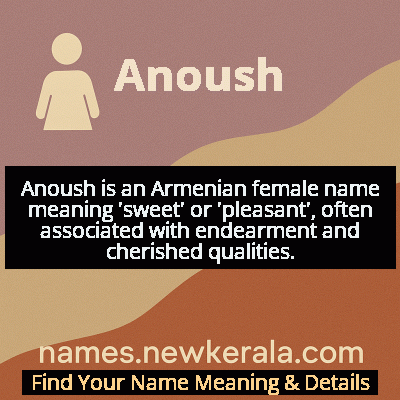Anoush Name Meaning & Details
Origin, Popularity, Numerology Analysis & Name Meaning of Anoush
Discover the origin, meaning, and cultural significance of the name ANOUSH. Delve into its historical roots and explore the lasting impact it has had on communities and traditions.
Name
Anoush
Gender
Female
Origin
Armenian
Lucky Number
6
Meaning of the Name - Anoush
Anoush is an Armenian female name meaning 'sweet' or 'pleasant', often associated with endearment and cherished qualities.
Anoush - Complete Numerology Analysis
Your Numerology Number
Based on Pythagorean Numerology System
Ruling Planet
Venus
Positive Nature
Harmonious, responsible, caring, and artistic.
Negative Traits
Overly idealistic, superficial, possessive, or jealous.
Lucky Colours
Pink, turquoise.
Lucky Days
Friday.
Lucky Stones
Diamond, turquoise.
Harmony Numbers
2, 3, 9.
Best Suited Professions
Artists, musicians, teachers, healthcare workers.
What People Like About You
Warmth, nurturing nature, artistic flair.
Famous People Named Anoush
Anoush
Singer
Legendary Armenian folk singer with over 50-year career preserving traditional Armenian music
Anoush Hovhannisyan
Opera Singer
Internationally acclaimed soprano performing at world's premier opera houses
Anoush Abrar
Photographer
Renowned photographer featured in Vogue, Harper's Bazaar and other major publications
Anoush Baghdassarian
Chef
Award-winning chef promoting Armenian culinary heritage globally
Name Variations & International Equivalents
Click on blue names to explore their detailed meanings. Gray names with will be available soon.
Cultural & Historical Significance
During the Armenian Genocide of 1915, traditional names like Anoush took on new significance as symbols of cultural survival and resistance. Families choosing this name for their daughters were making a conscious statement about preserving Armenian identity in the face of attempted annihilation. In diaspora communities from Lebanon to the United States, the name became a touchstone connecting new generations to their ancestral heritage. Today, Anoush represents the continuity of Armenian culture across centuries and continents, embodying both the sweetness of tradition and the resilience of a people who have maintained their identity through tremendous adversity. The name serves as a living monument to Armenian artistic achievement and the enduring power of cultural memory.
Extended Personality Analysis
Individuals named Anoush typically exhibit a complex blend of gentle sensitivity and remarkable inner strength. Their 'sweet temperament' manifests as genuine warmth, empathy, and a natural ability to make others feel understood and valued. Anoush personalities are often highly intuitive, possessing deep emotional intelligence that allows them to navigate complex social situations with grace and compassion. They tend to be creative souls, drawn to artistic expression through music, writing, or visual arts, frequently inspired by their rich cultural heritage. Their strong connection to family and tradition makes them excellent preservers of cultural knowledge and family history.
Despite their gentle exterior, Anoush individuals demonstrate surprising resilience when faced with challenges. They possess a quiet determination and emotional fortitude that enables them to overcome adversity while maintaining their essential kindness. This balance of sensitivity and strength makes them excellent caregivers, mediators, and community builders. However, their deep emotional awareness can sometimes lead to periods of introspection or vulnerability to emotional overwhelm. Anoush people typically form deep, lasting relationships and excel in professions that require understanding human nature, such as psychology, teaching, or the arts. Their presence often has a calming effect on others, and they're frequently sought out for wise counsel and emotional support.
Modern Usage & Popularity
In contemporary naming practices, Anoush maintains its status as a beloved traditional choice within Armenian communities worldwide while gaining some international recognition. The name demonstrates remarkable staying power rather than following fleeting naming trends, reflecting its deep cultural roots and timeless appeal. Among the Armenian diaspora in countries like the United States, France, and Lebanon, Anoush serves as a meaningful connection to heritage while fitting comfortably into multicultural societies. In Armenia itself, the name consistently ranks among popular choices, particularly among families emphasizing cultural preservation. Modern usage shows interesting patterns: urban professional families often pair Anoush with contemporary middle names, while traditional families might combine it with classic Armenian names like Mariam or Siran. The name's melodic quality and beautiful meaning have attracted some non-Armenian parents seeking unique, meaningful names with cultural depth. Social media and global connectivity have increased the name's visibility, with Armenian influencers and celebrities named Anoush introducing the name to broader audiences while maintaining its authentic cultural significance.
Symbolic & Spiritual Meanings
Symbolically, Anoush represents multiple layers of meaning that extend far beyond its literal translation of 'sweet.' The name embodies the Armenian cultural ideal of 'kini líz' (sweet word) - the belief that gentle speech and kind temperament create harmony in relationships and communities. It symbolizes emotional purity and the transformative power of kindness in a world often marked by hardship. The name also carries the bittersweet symbolism of its literary origin - representing both the joy of love and the pain of loss, mirroring the Armenian historical experience of beauty emerging from suffering. Anoush serves as a living symbol of cultural continuity, connecting modern bearers to centuries of Armenian poetic tradition and the romantic ideal of love that transcends temporal boundaries. Metaphorically, the name suggests a person who, like honey, brings natural sweetness and nourishment to others' lives while possessing the complexity and depth that comes from rich cultural heritage. It represents the idea that true strength often resides in gentleness, and that cultural identity can be preserved through the simple, powerful act of naming.

